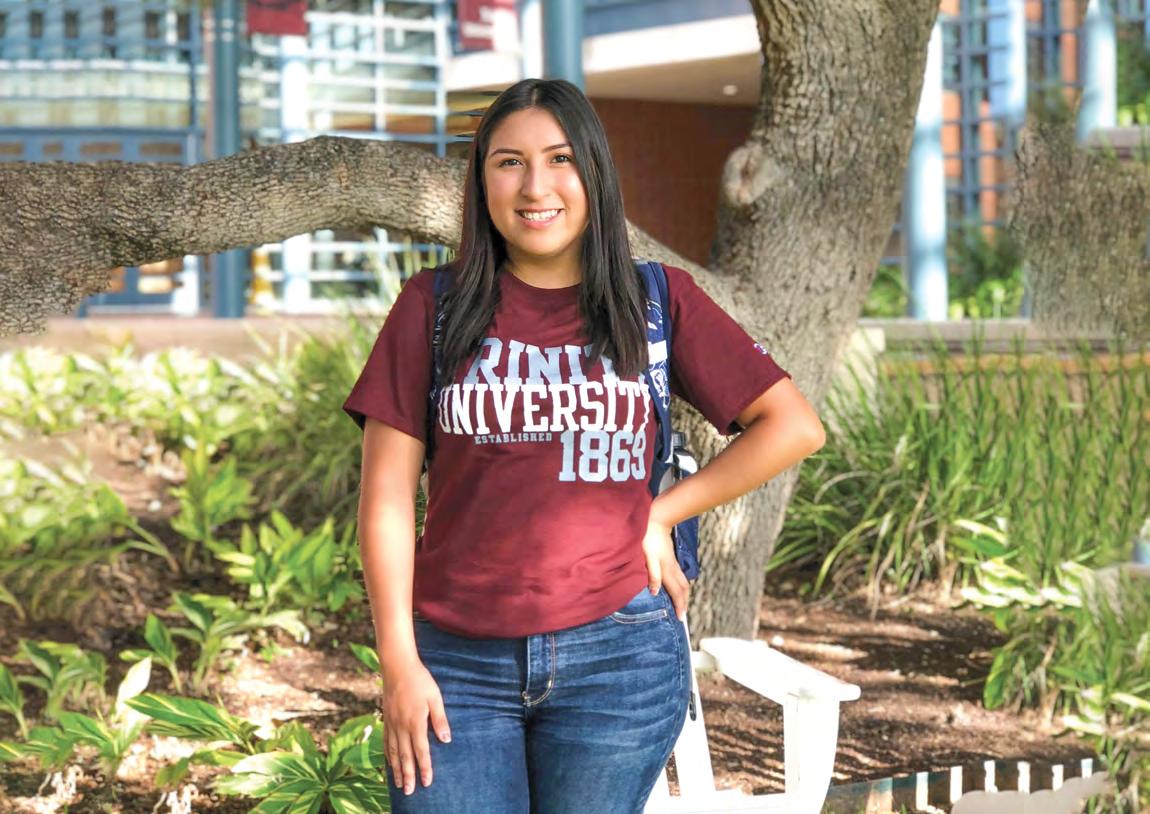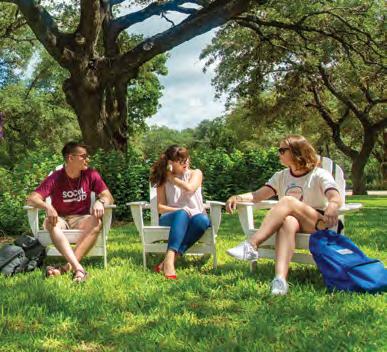Taking the Stage

Trinity



Trinity

Are you ready to take the national stage? Trinity University is ready to put you there.
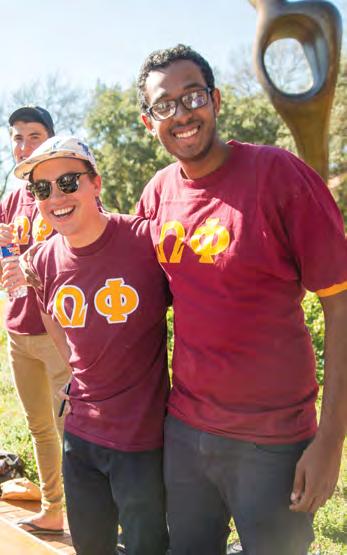
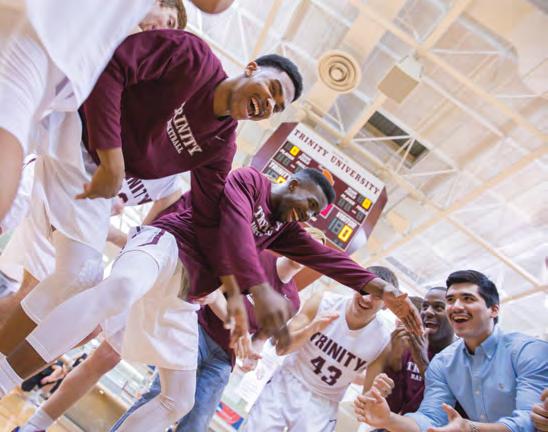
After more than 150 years of redefining the liberal arts, Trinity is finally celebrating its formal arrival on the national stage. In our debut in the national category, Trinity was listed as No. 55 by U.S. News & World Report in its 2022-23 rankings of best liberal arts colleges, placing the University as the No. 1 national liberal arts college in Texas. We’re trending up, and we’re doing it through our steadfast values of enduring excellence, intentional inclusion, and perpetual discovery.
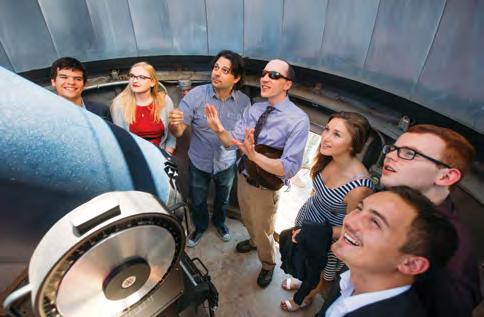
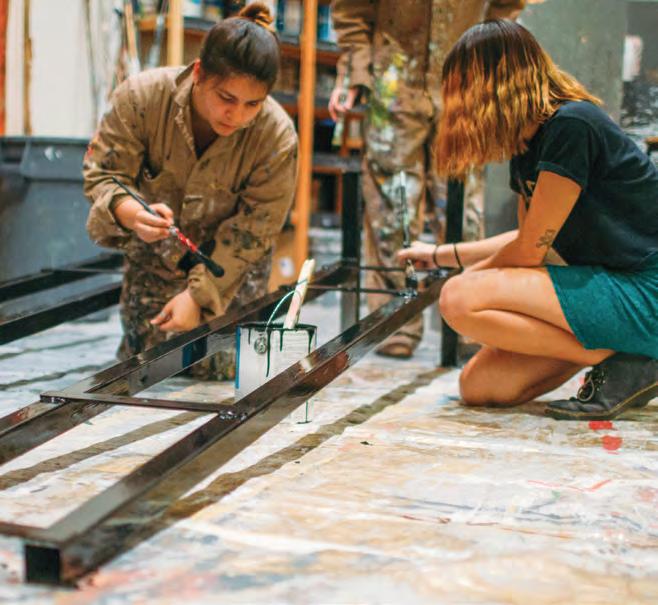
At Trinity, the student experience comes first. This experience is enriched by our versatile liberal arts curriculum, which allows you to pursue new interests while holding onto existing passions and talents, and our residential campus, enmeshed within a fastgrowing urban community that serves as a multicultural laboratory with demographics reflective of the future of the United States. Plus, our dedicated, nationally acclaimed faculty serve not only as educators and mentors, but also as partners and collaborators in scholarship, research, and experiential opportunities.
At Trinity, support for the student experience doesn’t stop in the classroom. With a steadfast commitment to increasing graduation and retention rates, increasing access and social mobility, and increasing affordability, Trinity University will continue redefining the liberal arts for the 21st century.
If you’re ready for the bright lights, we’re ready for you.

The Trinity Perspective magazine offers a glimpse into the many ways Trinity University prepares students to lead lives of meaning and purpose. Trinity is known for its stimulating, resourceful, and collaborative environment, filled with students who want an education that instills confi dence, inspires curiosity, and ig nites change. Flip through these pages to see for yourself!
Join the conversation:
Facebook: @TrinityUniversity
Twitter: @Trinity_U and @TrinityU_Admiss Instagram: @trinityu and @trinityuadmissions

Have a question for a current student? Email your questions to our current students at AskATiger@trinity.edu

Have a question for an admissions officer, faculty member, or other staff member? Email us at admissions@trinity.edu and we’ll get it answered.
Trinity University One Trinity Place San Antonio, Texas 78212 admissions@trinity.edu www.trinity.edu/admissions 1-800-TRINITY
Trinity University is a private, residential, co-educational institution in the heart of vibrant, intercultural San Antonio. Trinity offers its 2,500 undergraduate students a hands-on education rooted in the liberal arts and sciences that integrates conceptual and experiential learning, emphasizes undergrad uate research, and develops strong leadership skills.
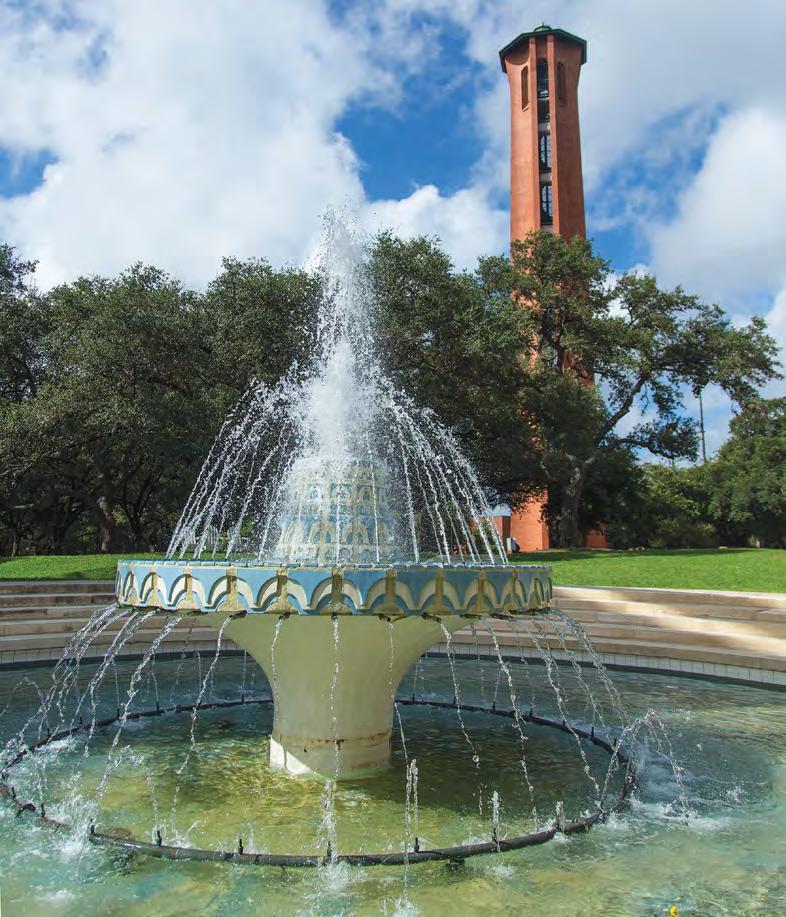
If you’ve had to shelter in place or isolate during the COVID-19 pandemic, you can probably relate to the experience of learning a bit more about yourself.
Whether this means taking up old hobbies or pursuits that you put on hold during school or work, or exploring new ones, one silver lining to periods of isolation can be discovering new pieces of who you are.
And according to a group of Trinity undergraduate re searchers, this trend toward self-discovery just might be a literal one for transgender and nonbinary individuals.
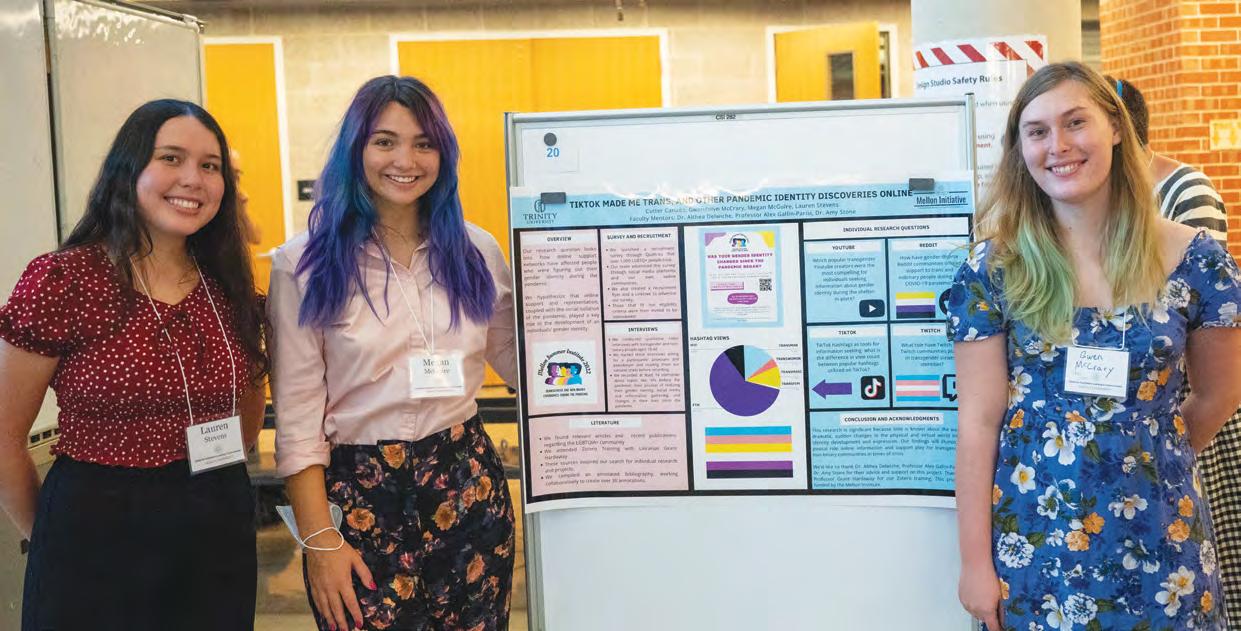
Cutter Canada ’24, Gwen McCrary ’23, Megan McGuire ’23, and Lauren Stevens ’24 are examining the effects of shelter-in-place orders on people making discoveries about their gender.
“Anecdotally, we’ve heard of a lot of trans individu als saying, ‘COVID (isolation) was very large for my gender exploration and identity,’” Gwen says. “So, we’re basically attempting to suss out the extent that COVID has impacted trans and nonbinary individu als in terms of how their gender identity was formed as well as taking a look at social media and how that’s
impacted where these people get resources and assistance and who they talk to.”
This research has been conducted under Trinity’s unique Mellon Initiative Summer Undergraduate Research Fellowship in the Arts and Humanities, known as the SURF program. This 10-week summer program gives students like Gwen a chance to work directly on faculty mentors’ research. Students get a $4,200 stipend and free housing during the summer, along with a travel and supplies budget. The SURF program allows these funds to be used up to a year after their initial summer research period, so the team of students have continued their research into the fall.
Gwen says the stipend and housing were vital for their team over the summer, allowing them to avoid driving long distances or relying on long-distance digital communication to work together. This meant more time devoted to conducting research.
And believe us, there was a lot of it. Each of the four students has actually posed their own unique
Trinity students examine pandemic’s effect on trans and nonbinary community
research question relating to a different social media aspect of the research: Lauren has worked to determine which YouTube content creators were popular and compelling for trans individuals; Gwen wants to know how trans individuals have rallied around other trans individuals on the streaming platform Twitch; Cutter has sought to get to the bottom of the disparity in TikTok views between trans men and trans women; and Megan is exploring online support groups for trans and nonbi nary people, particularly on the website Reddit.
Dealing with this workload can be tough for any undergraduate researcher. That’s why the team grate fully acknowledges the close support they’ve gotten from each of their faculty mentors, an interdisciplinary team from Trinity’s sociology and anthropology department, communication department, and library.
“Our faculty have been really awesome. They’re such a very organized group,” Cutter says, “and they’re also fun and easy to talk to. Our weekly Wednesday meetings have never been stressful or difficult, and it’s just fun to get to meet with them and talk about our experiences.”
This camaraderie isn’t just a nice-to-have: It’s an essential component to undergraduate research at Trinity, where faculty place as much emphasis on teaching through research as they would with publishing or production.
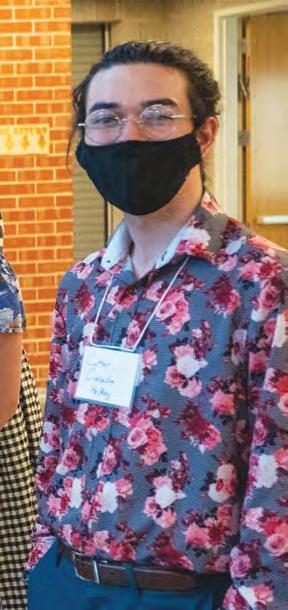
With faculty and students working side by side, Megan says that this research may be posing previ ously unasked questions, but finding answers is more vital than ever.
Having more vocalized stories and spotlights on gender-diverse people in a time when they are being ‘othered’ is really important.
“The COVID-19 pandemic and other public health crises impact marginalized people in particular on a much bigger scale,” Megan says. “We’re also seeing how these crises can affect trans and nonbinary people, par ticularly when they don’t have in-person support sys tems in the same way that cisgendered people would. So, they might have to go home and isolate with people who don’t support and validate their identity.”
And for Cutter, there couldn’t be a more pivotal time for the group to share these findings with the world.
“Outside of the pandemic, right now with the way the world, and especially our country, is going, having more awareness of and more vocalized stories and spotlights on gender-diverse people in a time when they are being ‘othered’ is also really important,” he says. “Especially because if you let them have a platform where they can speak, they can be heard in ways that may not have been available to them before.”
 by Jeremy Gerlach
by Jeremy Gerlach
Singing in New York City’s famed Carnegie Hall is as prestigious as it gets for any vocal performer.
And it sure beats singing through a mask in a parking garage, says Olivia Wehrung ’22.
“Singing at Carnegie is a once-in-a-lifetime op portunity,” Olivia continues. She was part of a group of Trinity University students who performed in a cathartic and memorable sold-out concert at the venue this past summer. “Being shoulder to shoul der in Carnegie Hall, barely a year after we had to constantly measure 6 feet between each other just to practice in the parking garage [on campus], is a testament of how much things have changed for us.”
Thanks to generous funding from the DicksonAllen Foundation, Trinity’s director of choral activi ties, Gary Seighman, D.M.A., led a group of current students and alumni into Carnegie Hall, staging an individual performance and serving as the core ensemble for the large festival chorus performing Mozart’s Requiem with the Chamber Orchestra of New York. Both performances were met with stand ing ovations.
You might think these singers are all on course for professions in music, but many of them—as is
the case with most students in musical ensembles at Trinity—aren’t even music majors.
That’s music at Trinity, where amazing experiences happen in harmony thanks to an inclusive, versatile liberal arts approach; a commitment to musical excellence spurred by dedicated, acclaimed faculty; and a strong community of social and financial alumni support.
Take Allison St. John ’20, a chemistry major who joined Trinity’s choral program, handbell ensemble, and a student-run a cappella group during her time at the University. She’s now working on her Ph.D. in chemistry at the University of New Hampshire, but she jumped at the chance to reunite with her musical counterparts on this trip.
“It’s always wild, especially because I’m not really a musician in career prospects,” says Allison, who also was part of life-changing Trinity choral trips to China and Austria. “But I’ve gotten to do some really amazing venues at Trinity. So, it’s always really sur real, almost as if I don’t feel like it’s really my place.”
Even Olivia, a music education major and teaching minor who is pursuing a career as a music instructor and conductor in Trinity’s Master of Arts in Teaching
program, struggled with her own sense of imposter syndrome on the trip. It’s enough of a challenge to perform at a venue like Carnegie Hall. To add to that pressure, Olivia got to make her own conducting debut at Carnegie when Dr. Seighman surprised her with the chance to conduct a segment of the choir’s individual performance.


“This is the world’s most famous stage. Having the opportunity to sing there was cool, but getting to conduct was a once-in-a-lifetime opportunity that some people don’t even get to have once-and I got to have it at the age of 22,” she says. “At Trinity, there’s so many opportunities in every department, regardless of your major—and you just have to take them. You don’t let the imposter syndrome scare you away.”

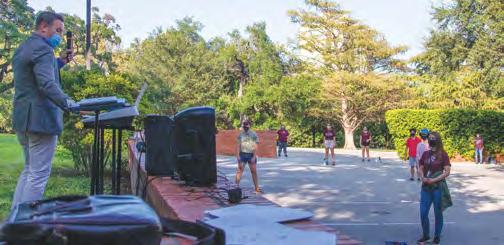
Perhaps one of the most meaningful opportuni ties for the Tigers on the trip was the chance to reconnect with a close-knit Trinity community of classmates and alumni.
In addition to nearly 20 Trinity alumni from ear lier decades, many recently graduated singers joined
the students on this trip, thrilled to be seeing their friends again after many never got to come back to campus in spring 2020, had trips postponed and classes held over Zoom, or socially distanced over the course of 2021.
“It was a wonderful sense of closure, especially for the 2020 grads, because their time at Trinity ended so abruptly,” Olivia says. “And then the ’20 and ’21 grads…didn’t go on tour, and we didn’t have any in-person concerts. [This] was the closure they all needed for the really tumultuous end to their college experience.”
For Olivia, this performance closed the chapter on her time as an undergraduate. She says she’s starting to feel less like an imposter and more like someone who belongs on the big stage.
“I’m thinking about pursuing a master’s and a doctorate in conducting because I want to conduct college choirs,” Olivia says. “Dr. Seighman tells me that this won’t be my only time conducting in Carn egie Hall, so this trip felt, for me, like a little sneak peek into what my future holds.”
At Trinity, there’s just so many opportunities in every department, regardless of your major—and you just have to take them.
When you know, you know. At least, that was the case for Jenna Kash ’22, a business analytics and technology major from Flower Mound, Texas.

Growing up, Jenna had envisioned graduating high school and attending a large, public university. On her first visit to Trinity University, this quickly changed. “I got out of the car, and I said, ‘Wait, I want to go here,’” she remembers. “Once I looked into the academics, I felt it was perfect.”
Jenna has always been academically driven, receiving the Murchison Scholarship based on her merit as an incoming first-year student. She grew up playing com petitive softball and found her way to college athletics somewhat unconventionally. “I sent the coach an email introducing myself just for fun, and she got back to me,” she says, laughing. Trinity’s Division III athletics struck the perfect balance for Jenna, who had experienced the all-consuming nature of club teams in high school and was looking for a more balanced college experience.
“This team was different,” she says. “It was just as competitive, but you could still focus on academics and other parts of your life.”
Jenna came to Trinity with an interest in player statis tics that began in childhood, watching baseball games with her dad. She has a “numbers head” and gravitated toward statistics courses as a first-year student. The business analytics and technology major (BAT) was a perfect fit for Jenna because of its interdisciplinary curriculum. “The program gives students opportuni ties to work with real-life data,” she says. “BAT is broad enough that you can apply your skills to any industry you are passionate about.”
Jenna ambitiously added two minors in data science and sport management and combined those interests when she landed an internship at AthleteAlly, a na tional organization that promotes LGBTQ+ inclusion in college athletics. In this role, she pored over massive amounts of data relevant to eight different criteria used
to rank NCAA schools on discriminatory practices. After the internship ended, she continued her research with AthleteAlly through an independent study pro gram for class credit.

“It was really intimidating at first, because everyone on the research team was getting their Ph.D., and I’m out here as a 19-year-old,” Jenna says.
Jenna credits this early practical experience in data analytics as a major reason she was offered a postgradu ate customer relationship management job at Spurs Sports and Entertainment, home of the San Antonio Spurs NBA team. She eagerly accepted and is excited to use her expertise to improve the spectator’s experience by analyzing fan behaviors—but not without remem bering the path she took to get there.
“I’m grateful for the relationships I have made and the confidence I’ve gained on my journey here, both personally and professionally,” Jenna says. “Trinity is a special place for me because it gave me space to develop all aspects of my life that I care about.”
When you think of art, you probably imagine paint ings, sculpture, or even music. Art doesn’t only have to be observed through your eyes and ears, though. Mengyu Liu ’19 is dedicated to producing art that ap peals to the nose.
“There are not a lot of people trying to explore artistic expression for the smell,” Mengyu says. “I think it has a lot of potential. It’s a way to discover new artistic expres sions and new experiences.”
Mengyu’s interest in the fragrance world is something he discovered while pursuing a biochemistry and mo lecular biology major at Trinity.
“From the beginning, I really liked chemistry,” Mengyu says. “It was what I wanted to do in the future. Meanwhile, during my second year, I was really fasci nated by the olfactive (fragrance) world, so I thought, ‘Maybe I can combine those two.’”
Mengyu joined a biochemistry project with chemis try professor Corina Maeder ’99, Ph.D., studying how different constituents of a molecule can affect its olfac tive content. That research further cemented his inter est in perfumery, so he looked to expand his education in the subject.

“I did a lot of courses during the summer of my sophomore year at the Grasse Institute of Perfumery,” Mengyu says. “I enjoyed it. The entire process really brought me a lot of joy and happiness, which further confirmed that I really wanted to do this in my future.”
After graduating in 2019, Mengyu attended ISIPCA, a French perfumery school founded by famous perfumer Jacques Guerlain. Liu received his master’s degree from ISIPCA and now works in Paris at Symrise, a global fragrance company. His job includes consumer insight, marketing, and fragrance evaluation.
“I smell the perfumes created by our perfumer team,” Mengyu says. “My job is to make a creative story about the fragrance based on its olfactive properties. The story I create has to be related to the motives of the perfumer when they created the perfume.”
Although his current job may sound more artistic than scientific, chemistry still plays a major role in fra grance evaluation.
“There are a lot of sides to perfumery,” he says. “For example, for the creative side, you need the artistic talent
to create this imaginary thing-to create a story. You’re also required to know the chemistry side, in terms of evaluating the stability and the safety of the solutions, and how to analyze a fragrance formula from a competi tor by using analytical tools.”
Mengyu hopes to eventually open a fragrance school in his hometown of Chengdu, China, where there is a lack of resources regarding perfumery.
“People want to know more about perfumery, about the fragrance products and the industry, but it’s very hard for them to find the information and resources to be educated. That’s something that I want to do.”
Nestled in the heart of Trinity University’s Coates Library, the Tiger Learning Commons (TLC) is a centralized hub for academic coaching, writing and quantitative reasoning tutoring, and student accessibility services. Guided by a common mission to empower students, the offices of the TLC work together to offer an engaging and collaborative learning environment.
In the TLC, you can find:
Academic Coaching
Students receive personalized, one-on-one meetings with a trained academic coach who can help them improve their skills and performances, even in topics such as time management, goal setting, and test preparation.

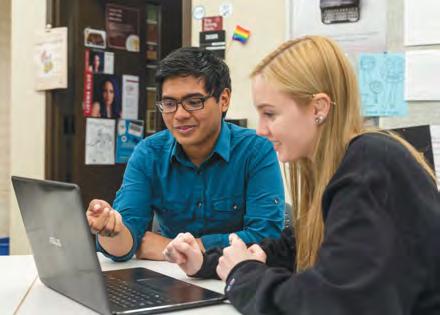

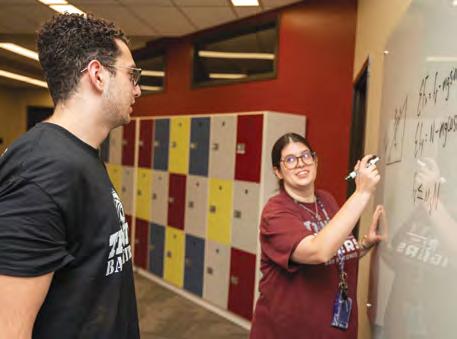
Student Accessibility Services ensures that students with disabilities have equal access to curricular and co-curricular activities and services by arranging accommodations, trainings, consultations, and technical assistance.

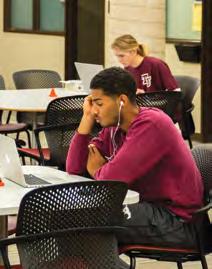
The Writing Center offers walk-in tutoring as well as evening skill workshops to students in all stages of the writing process.
The QRS Center offers one-on-one support for students taking quantitatively demanding courses in addition to both general and course-specific workshops.
In addition to the Writing Center and QRS Center, there is an abundance of opportunities to receive tutoring at Trinity. Tutors are available across disciplines, from the humanities and social sciences to business.
Learn more at gotu.us/TLC.
We invite all prospective students to tour our skyline campus, engage with current students, and learn about the academic experience, admissions pro cess, and financial aid options. Attend an open house or register for one of our daily visit opportunities. In the spring, we offer visit experiences exclusively for students admitted to Trinity!
Visit gotu.us/visit to review all options and register.
Information Sessions and Campus Tours: Weekly, Monday-Friday Select Saturdays Spring Break
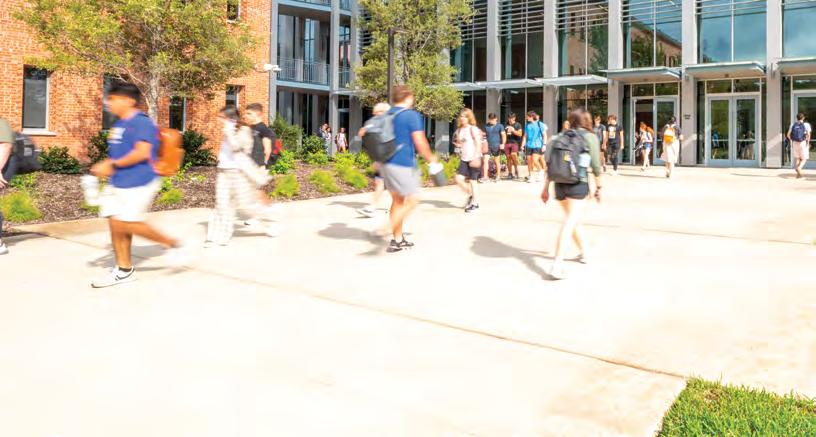
Trinity In Focus Open House Event: Saturday, Jan. 21, 2023
Tiger Friday Preview Days for Admitted Students: March 3, 2023 March 24, 2023 April 14, 2023 April 21, 2023
To ensure you are considered for the full array of financial resources available, students applying for financial aid should submit the following applications by the admissions application deadline.
Free Application for Federal Student Aid (FAFSA)
Trinity’s school code is 003647. studentaid.gov
CSS Profile
Trinity’s school code is 6831. cssprofile.collegeboard.org
There’s still time to enjoy the rest of your senior year! Apply early, know early.
At Trinity University, applying Early Decision is recommended for students who, through diligent reflection and research, identify Trinity as their first choice and commit to enroll if admitted. To assist in your decision-making process, we encourage you to review Early Decision benefits, myths, and advice at gotu.us/earlydecision, where you can also request an early financial aid estimate.
If you’re ready to take advantage of the expert faculty, beautiful campus, and first-rate resources and opportunities at Trinity, apply today via Early Decision II and receive your admissions decision and scholarship eligibility by March 1.
This program is a binding agreement. Students are ethically bound to apply Early Deci sion to only one school and will be expected to attend if offered admission.
Trinity offers these scholarships that require separate applications:
• Storer & Tillman Scholarship for Developing Christian Leaders: a need-based award for student servant-leaders (Dec. 1 deadline)
• Baker Duncan Fine Arts Scholarships: awards for students with special interest in art, debate, and theater (Feb. 7 deadline)
• Music Scholarships: awards for students interested in continuing involvement in vocal or instrumental music (Feb. 21 deadline)
Find more information at gotu.us/meritaid

